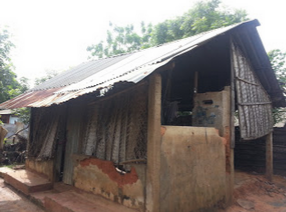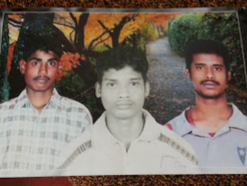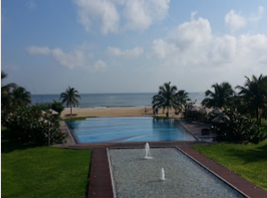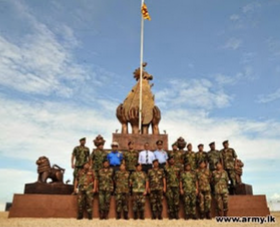Independent Report Finds Sri Lankan Government Systematically Violating Human Rights of Tamils, Other Minorities
INVESTIGATION EXPOSES MILITARY OCCUPATION AND COLONIZATION OF TAMIL LAND IN SRI LANKA
A new independent report on the state of human rights in Sri Lanka – the first since the end of the country’s 26-year civil war in 2009 – finds that a silent war continues in which thousands of Tamils, mostly Hindus and Christians, are still internally displaced and subject to military occupation and fierce discrimination by the predominantly Buddhist Sinhalese majority.
The conflict ended violently after the government’s bloody military offensive that led to the surrender of the LTTE (Liberation Tigers of Tamil Eelam) and left widespread destruction, the deaths of tens of thousands of civilians and the displacement of the entire population living in rebel-controlled territories.
Efforts by the United Nations High Commissioner for Human Rights to undertake a war crimes inquiry into violations of human rights, seizures of lands, and related crimes by both Sri Lankan state forces and Tamil separatist rebels have been thwarted by the Sri Lankan government. Thus, the investigation in December 2014, based on fieldwork and hundreds of interviews, led by Anuradha Mittal, an internationally renowned expert on human rights and land issues and executive director of the Oakland Institute, is the first to take place since the war ended, conducted with the knowledge but not the cooperation of the Sri Lankan government.
The report comes on the heels of a recent visit by US Secretary of State John Kerry in which he praised the newly elected government and offered support.
The new report, The Long Shadow of War: Struggle for Justice in Post War Sri Lanka, found that:
- 6 years after the end of the war, the traditional Tamil homeland is still under heavy military occupation by at least 160,000 mostly Sinhalese soldiers, one for every 6 Tamil civilians.
- The army has engaged in large-scale property development, running luxury tourist resorts and business ventures on land seized from local populations. Thousands of Tamil families remain displaced on their own land, helpless witnesses of this ‘development’.
- Tamil culture and history are being systematically suppressed by a government-led effort to construct victory monuments and Buddhist shrines that speak to Sinhalese domination in former Tamil homelands, where even now few Buddhists live.
- Thousands of people continue to be missing since the war ended in spite of the government’s promise to engage in a process of truth and reconciliation. A 2012 UN report referred to more than 70,000 missing while other estimates are twice that number.
While much has been made of the peaceful government transition that took place after elections in January of this year, the investigators raise concerns as to whether the new President Sirisena, has the political will or space to deal with these issues.
“The recent appointment of Major General Jagath Dias as the Army Chief of Staff, one of the armed forces’ highest post, despite the fact that under his command the 57th division was implicated in serious human rights abuses, rebuffs current government pledges to credibly investigate alleged war crimes through a domestic accountability mechanism,” said Ms. Mittal.
“This is a vital moment for the future of Sri Lanka. Until the new government takes decisive action to curtail and reverse the colonization process, truly replacing the culture of impunity with a culture of responsibility and accountability, there is little hope that the Tamils and other minorities will be treated justly. It should be the responsibility of the international community, and not a political dilemma, to ensure the human and land rights of the minorities in Sri Lanka,” she added.
The Oakland Institute, based in Oakland, CA, is an independent policy think-tank, bringing fresh ideas and bold action to the most pressing social, economic, and environmental issues of our time. It does not receive funding from any government or political party.
###
Sri Lanka
Reports and Briefs
The bloody civil war that ravaged Sri Lanka for 26 years officially ended in 2009 with the defeat of the minority Tamil separatists, led by the Liberation Tigers of Tamil Eelam (LTTE). The conflict, in which the LTTE opposed the government led by the majority Sinhalese Buddhists, killed around 200,000, led to the displacement of more than a million people, destroyed infrastructure across the country, and took a heavy toll on the lives and livelihoods of the population of the Northern and Eastern Provinces.
In December 2014, the Oakland Institute carried out research and fieldwork in Sri Lanka in order to understand and document the state of land conflicts and displacement amid accusations of land grabs experienced by the Tamils and other minorities at the hands of the Sri Lankan army and the government. While investigating the land grabs, the research team witnessed discrimination, harassment by the police, and horrors of the civil war that continue to torment minority groups, especially the Tamils, even today.
Press Releases
Sri Lanka Image Galleries
Oakland Institute: SLG Systematically Violating Human Rights of Tamils, Other Minorities
by Oakland Institute, California, May 28, 2015





